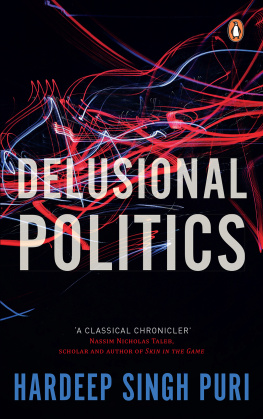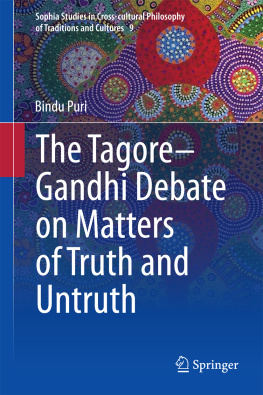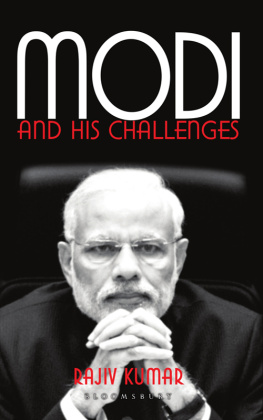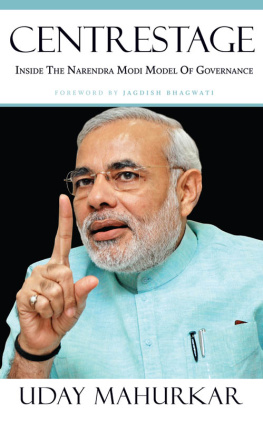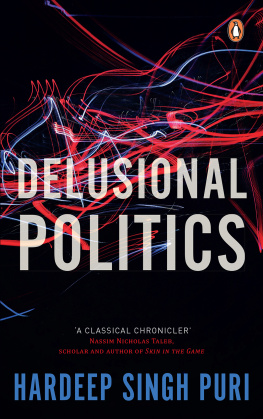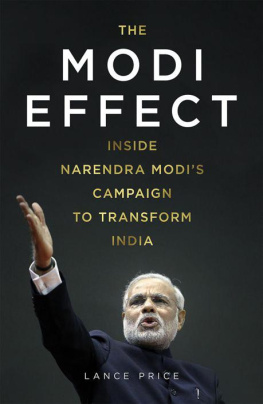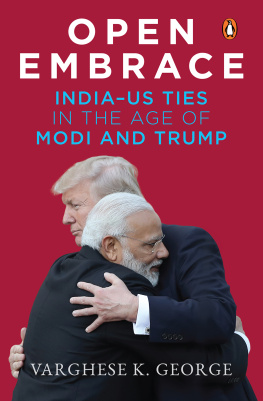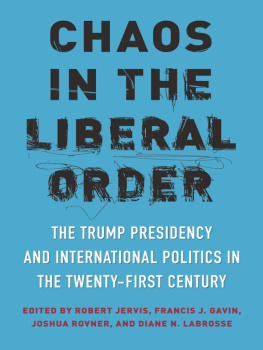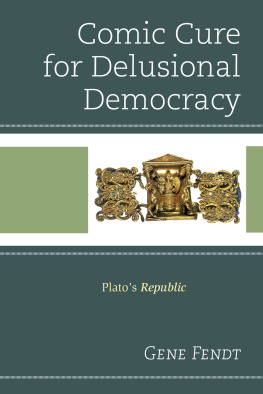Advance Praise for the Book
Hardeep Singh Puri has, among other attributes, that rarest of qualities: lucidity of mind. If you want to learn about current events, read his accounts in Delusional Politics. Every chapter is a summary that cuts through the journalistic noise to give you the pure signal. Like a classical chronicler, he manages to provide clarity about what happens in our time, put things in context, and deliver to you the proper context to make up your mind. It is as if a historian is covering the present with the same filtering one can possibly apply only to the pastNassim Nicholas Taleb, scholar and author of Skin in the Game, Antifragile and The Black Swan
Delusional Politics is a sophisticated and deep reflection on the technological, political, economic and social forces driving this tumultuous era in global affairs. As a diplomat, policymaker and politician, Hardeep Singh Puri cuts through common opinion to reveal new insights into our present malaise. Rich in both historical and contemporary examples, it argues a number of thought-provoking and controversial propositions. This is an important contribution to the debate about the future of the global orderand how we might fix itThe Hon. Kevin Rudd, former prime minister of Australia, and president, Asia Society Policy Institute
Hardeep Singh Puris book Delusional Politics is insightful, thought-provoking, superbly researched and deftly crafted. While its an engaging story on global politics and global governanceand a textbook battle plan for anyone who wants to formulate foreign policy in todays worldit is also much more... its a fascinating read! The lucid, open-hearted account makes interesting and informative reading for academics and practitioners alike. Puris unique experience and brilliant writing brings out the authentic richness of the world we are living in. The book could well be the key to all our futuresAmitabh Kant, chief executive officer, National Institute for Transforming India (NITI Aayog)
This is a diplomatpoliticians unsparing political scrutiny of the rise of populism and a bruising shift from facts to belief-based politics in the post-truth era. The book looks at how Donald Trumps rise has more to do with white working class woes than with racism; and how Narendra Modis popularity is a break from the culture of impunity that existed before him. While populism has been a reality in democracies for long, he says, social media can be its force multiplier. This results in delusional politics, and delusional decision-makingShekhar Gupta, senior journalist
For Himayani, our first born and one of gods greatest gifts to us. Himayani is a celebration and inspiration of Lakshmis and my life.
The Setting
Be humble, for you are made of earth.
Be noble, for you are made of stars.
Serbian Proverb
A re you psychic or what? First Brexit and now Trump!
This was the essence of a crisp message from our younger daughter Tilottama on the morning of 6 November 2016 when it became abundantly clear that Donald Trump was going to carry the electoral college.
No, I am certainly not a psychic. However, forty years of professional life has taught me to see the fault lines in a flawed narrative. My instincts have, over the years, been sufficiently honed to see through a situation in which a narrative is contrived. Producing an erroneous narrative is bad enough. But then to market it as the dominant mainstream narrative suggests a more serious underlying problem. Anyone can get an assessment wrong or make a wrong prediction. But if the expertise is suspect and the analyst or commentator has a vested interest in producing a flawed narrative, then the very essence of the democratic process stands undermined.
My friend Nassim Nicholas Taleb, the author of The Black Swan: The Impact of the Highly Improbable, Anti-fragile: Things that Gain from Disorder and so many other brilliant books, called this a global riot against pseudo-experts. Learned commentators the world over got both the Brexit and the Trump victory wrong. Many reputations should have been destroyed, including those of CNN and the New York Times. But instead of gracefully accepting their mistake(s), they dug in and decided to join the battle. They refused to come to terms with the fact that Trump could or, more importantly, should be allowed to win. Brexit and the election of the forty-fifth President of the United States (POTUS) were just the beginning of a process. Social media had already altered the dynamic. Once Trump began to settle down, well before he completed a hundred days in office, the battle to set the narrative started in the right earnest. Factsas per the normal way they are understood, as being empirically verifiableappeared no longer sacrosanct. Their alternatives began to enter and occupy considerable space in the lexicon and the framing of narratives. The era of alternative facts and alternative narratives had finally arrived. It had been in the making for some time.
The world was in sufficient disarray and already in an advanced stage of entropy well before Brexit. Brexit and Trump, however, signalled the unveiling of an entirely different narrativeone only partly anchored in domestic mismanagement and influenced to a considerable extent by the processes of globalization.
Over the past quarter century, I have failed to be persuaded that the Western liberal democratic order represents the closest approximation to what is best for human civilization. The emphasis on human rights is laudable. The gains of globalization are also truly impressive. The model based on the processes of globalizationthe Washington Consensus and trade liberalization, which in turn produced unprecedented economic growthis, however, not without problems. Trade certainly helped individuals and nations to grow wealthy but has never been entirely free but managed. The so-called magic of markets is, at a certain level, a camouflage for rigging by elites.
That globalization produces winners and losers is a no-brainer. What has so far been underestimated is the angst of the marginalized and alienated voters among the losing segment. It is that angst which the intelligent politician taps into for political advantage. Taking advantage of something like public anger for short-term gain to seek political power for a larger good is one thing, quite another if that angst is used to unravel a society and country and to facilitate uncertainty and turbulence.
What is that trend and, if it is so, the process called? For want of a better term, populism, which is on the rise globally. Why? There must be several explanations. In order to outline the Setting for this book, I will confine myself to only a few.
Populism provides a vehicle, at one level, to secure power quickly. This vehicle is not powered and driven by intellectual rigour and careful analysis of facts and trends. Nor is there any attempt to sift facts from fiction, to distinguish between objective reality and contrived narratives.

